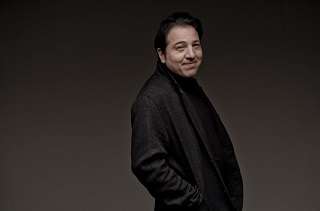|
Back
Esoteric Entertainment New York
Isaac Stern Auditorium, Carnegie Hall
04/29/2022 -
Fazil Say: Piano Concerto No. 2 “Silk Road”, Op. 4
Wolfgang Amadeus Mozart: Piano Concerto No. 23 in A Major, K. 488
Pyotr Ilyich Tchaikovsky: String Quartet No. 1 in D Major, Op. 11 (orchestrated by Christopher Theofanidis)
Fazil Say (Pianist)
Orpheus Chamber Orchestra

F. Say (© Marco Borggreve)
“I cannot express how honoured and proud I felt that my music could make such an impression on you.”
Tchaikovsky, on hearing that Leo Tolstoy was enamored of his First String Quartet
The mesmeric concert of the Orpheus Chamber Orchestra last night confirmed one of my prejudices, smashed another and bestowed a most aunexpected gift for the almost full audience.
Onto one prejudice: orchestrating 19th Century string quartets is a thankless job. Mahler failed with Schubert, Karl Münchinger made mincemeat of the Grosse Fuge, and Christopher Theofanidis, with all his genius in trying to give chamber-music orchestration in a Tchaikovskian manner, couldn’t quite create a patina for Tchaikovsky’s First String Quartet.
String quartets are more than intimate, more than “conversational”, they contain their own...shall we say mystery? An orchestra supercedes such mystery
Mr. Theofanidis was as masterful as could be expected. The opening lament of the first movement eschewed the original strings working around one cell–a doleful almost horrifying opening–then launching into a full chamber orchestral movement, with French horn coming near to the Fifth Symphony motive. As for the famous second movement Russian song, how marvellous were the strings playing solo, generating into a fugue. When the entire Orpheus Chamber Orchestra joined in, the loneliness of the song became a large Russian chorus.
The last two movements were treated like a Dvorák symphony: a furiant scherzo and a full‑bodied finale.
And now we come to the eternally youthful Fazil Say. I was thinking during the Mozart 23rd Concerto if the piano disappeared, he would still be a joy to watch. Exhilarating is too common a word. His feet were moving, tapping, playing the pedals for the resonance of his own work. His arms broke the mould of the conductor‑less Orpheus Chamber Orchestra, leading them whenever necessary.
(Then again, Mozart never needed a conductor and probably led the orchestra from the keyboard.)
As for Fazil Say’s digits, they could–as the first and third movements of the Mozart–become feather‑light. Did he sometmes exaggerate the tempos here? So be it, and amen.
Those were the bright gleaming moments. For the Adagio, where the orchestra gradually comes in over the piano, Mr. Say made no pretence of merely being soloist; he led the group oh so subtly, with the sensitivity of a fine painter.
The most important work was Mr. Say’s Second Piano Concerto, played with the orchestra. My prejudice had been that–outside of the Russian “Five”, or Cowell or Harrison–these fusions don’t work. Mr. Say squashed my preconception.
First, his “Silk Road” concerto had an almost impossible format. The four continuous movements went on a “road” from Tibet for India, to Iraq to Mr. Say’s homeland Turkey. Second, he used a variety of sounds, both from the piano (wooden tapping, inside the box), and the orchestra (glissandi and microtones and a sudden gong).
The result was not a mishmash. It was exotic, yes. It had a few moments of Rachmaninoff slurp. It had the cohesiveness of cross‑rhythms, or repeated motives (an empty fifth at the start, a stunning repeated piano bass note), with subtly shifting orchestral colors at the end. Mr. Say’s music had both and esotericism and eclecticism and electricity.
The surprise gift for the concert was a marvellous unlisted five‑minute piece by the Ukrainian composer Myroslav Skoryk. It would be heretical to say that it sounded Russian, but the plangent oboe, the slow string fluttering, and the underlying tension were...well, call it Slavic. A beautiful work, played with Orphic mystery by the ensemble.
Harry Rolnick
|